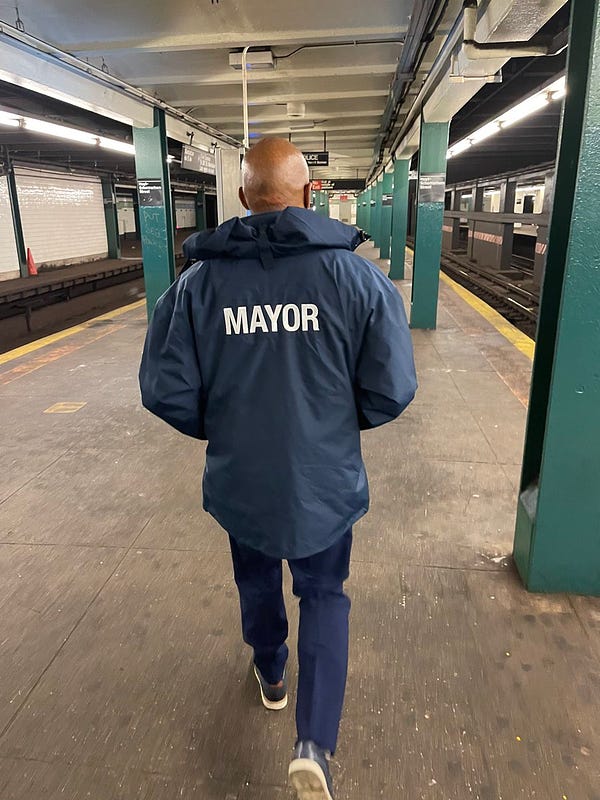You probably saw this. You probably dunked on it.

And you were right to do so. Decorum and standard behavior surely have their place in politics, especially in normal times. But in aberrant, abhorrent times, the President does not have to wear a suit. The sartorial imperative is over-ridden by a security perspective (Zelensky in body armor outside) or a communicative one — these are not normal times. Masha Gessen was excellent on this point with Ezra Klein.
MASHA GESSEN: A T.V. watcher, yeah. Or somebody who has the T.V. in the background all the time. So if you’re one of those people, then you don’t actually think there’s a war going on. And you don’t think there’s a war going on for two very specific but distinct reasons. One is that the government has decreed that there is no war. It is, in fact, a crime now, as of last Friday punishable by up to 15 years in prison, to call the war a war, or an invasion, or aggression.
So there is on television you hear that there is a special operation, there’s a peacekeeping operation, that there’s an operation to stop the hostilities. They use various turns of phrase, but basically the official name for it is the “Special Military Operation.” And you get the impression that it is led by these so-called separatist troops from Eastern Ukraine and supported to some unknown measure by the Russian military.
But I think that’s not even the most important reason that you don’t think much of anything is going on. The most important reason is that the actual tenor and flow of news hasn’t changed. So this newscast in which you learn about the special operation, or whatever it is they’re doing at the moment, lasts five minutes, right. It’s the regular news at the top of the hour.
It’s not — when I was flying to Moscow, that 20 hours that I spent because my flight was late and I was stuck in Paris for a while — 20 hours that I spent in airport terminals against those giant displays, you could tell, without even listening, without being able to hear what was being said, that something huge was happening in the world. You could tell that the flow of news had changed. You could tell that the picture had changed completely.
And it’s the opposite in Russia. The picture hasn’t changed. The tenor hasn’t changed. The timing hasn’t changed. And so the overall message is nothing much is going on, nothing huge is happening. And of course, you see the results of that in the street as well. On the Monday when the currency collapsed, there were some places there were some lines on banks, but other places there weren’t. There were no observable bank runs. People weren’t rushing to stores to buy durable goods.
The sartorial choice of Zelensky to wear a t-shirt or body armor communicates that something has changed. And while there is a lot to say about political costumes—Wen Jiabao’s raincoat, Putin’s high fashion parka, or Eric Adams, the new mayor of New York City, wearing a coat that says “MAYOR” on the back”


Paul Musgrave covered this territory well last year.
I want to pull back from the sartorial to the broader world of aesthetics. In particular, environmental activist and writer Bill McKibben penned an excellent and important essay for the New Yorker that covers a lot of ground that I’ve written about in this little newsletter (particularly my post “We’re Smoked”). But there was one passage that I wanted to highlight.
Another concession will strike many environmentalists more deeply even than accepting a degraded landscape, and that’s the notion that reckoning with the climate crisis would force wholesale changes in the way that people live their lives. Remember, the long-held assumption was that renewable energy was going to be expensive and limited in supply. So, it was thought, this would move us in the direction of simpler, less energy-intensive ways of life, something that many of us welcomed, in part because there are deep environmental challenges that go beyond carbon and climate. Cheap new energy technologies may let us evade some of those more profound changes. Whenever I write about the rise of E.V.s, Twitter responds that we’d be better off riding bikes and electric buses. In many ways we would be, and some cities are thankfully starting to build extensive bike paths and rapid-transit lanes for electric buses. But, as of 2017, just two per cent of passenger miles in this country come from public transportation. Bike commuting has doubled in the past two decades—to about one per cent of the total. We could (and should) quintuple the number of people riding bikes and buses, and even then we’d still need to replace tens of millions of cars with E.V.s to meet the targets in the time the scientists have set to meet them. That time is the crucial variable. As hard as it will be to rewire the planet’s energy system by decade’s end, I think it would be harder—impossible, in fact—to sufficiently rewire social expectations, consumer preferences, and settlement patterns in that short stretch.
He’s admitting that he liked that decarbonization would require “simpler, less energy-intensive ways of life.” And it is only with some reluctance that the revolutionary cost declines in renewables making it the cheapest electricity source ever have led him and others to give up on this pastoral image of what the future might be. To be sure, this passage does not go into deep pastoralism (see Eaarth) but more of a Twitter-verse debate about EVs as a solution rather than a stop-gap.
There are other primitivisms that one could delve into—even anti-sedentary beliefs from those who are determined to go against the grain. I, for one, appreciate that I was born on a planet with billions of other people and am not interested in spending much of my one precious and wild life contemplating alternative universes where our ancestors thousands of years ago simply never planted crops.
YIMBYism’s Difficult Aesthetics
I was halfway through writing this post when the political scientist and dancer Jake Grumbach just tweeted out the thesis.


Here’s the “insane ass pic” in question.
Status quo bias is ingrained into our psychologies. We are used to things being as they are. Change makes us notice things that might have been in front of our eyes but eluded our vision, escaped our attention. The United States is not particularly good at building things, and so our eyes are not used to lots of new construction, changing the urban fabric. Realities that were present—increasing land values, inequality, racism, inadequate provision of public services, overprovision of policing, etc.—are unmasked by demolition and reconstruction.
Sometimes debates about YIMBYism become almost purely about aesthetics. Jerusalem Demsas wrote about the “gentrification building” for Vox, and they made a video.
But if anything, this is not really about YIMBYs but about the sneering reaction to development associated with the political pressure of YIMBYs. In a previous era, it would just be the sneering. In The End of the End of History, the authors capture this kind of politics as aesthetic from an earlier era as ‘ethical selving.’
NIMBYs then combined the forces of the local homeowner who just wants his parking spot to always be there, which we understand to be venal but an actual pursuit of interests using the state, and cool kids cringing at gentrification buildings and lamenting developers’ profits. At the start, YIMBYs were often renters frustrated by high cost of living, perhaps who couldn’t convince friends to move to the city with them. Perhaps in the medium-term, with enough construction in the area, they could see rents drop, or maybe even give them a chance to purchase a unit rather than simply rent. They are attending meetings, getting organized, passing laws, to affect change. But in online debates at least, YIMBYs are joined by densifiers who see urban conglomerations as more environmentally sustainable, but also, as it happens, tend to find those spaces more desirable—they can sustain not just more people but a wider variety of restaurants, more walkable environs, fewer cars, more street life…. At least I do. Are my politics just aesthetics?
Bill McKibben has made his choice. He knows what he cares about — fighting climate change. He’s willing to give up on some of his vision for what he would like to see the world look like to save as many people as he can. Do you? Do I? We all have tastes and interests, beliefs about what the world is and what it could be. Pursuing them may cause some to cringe, but doing the work to inform, educate, motivate, and organize is the way to make them real.
More on pastoralism and degrowth in China to come.



